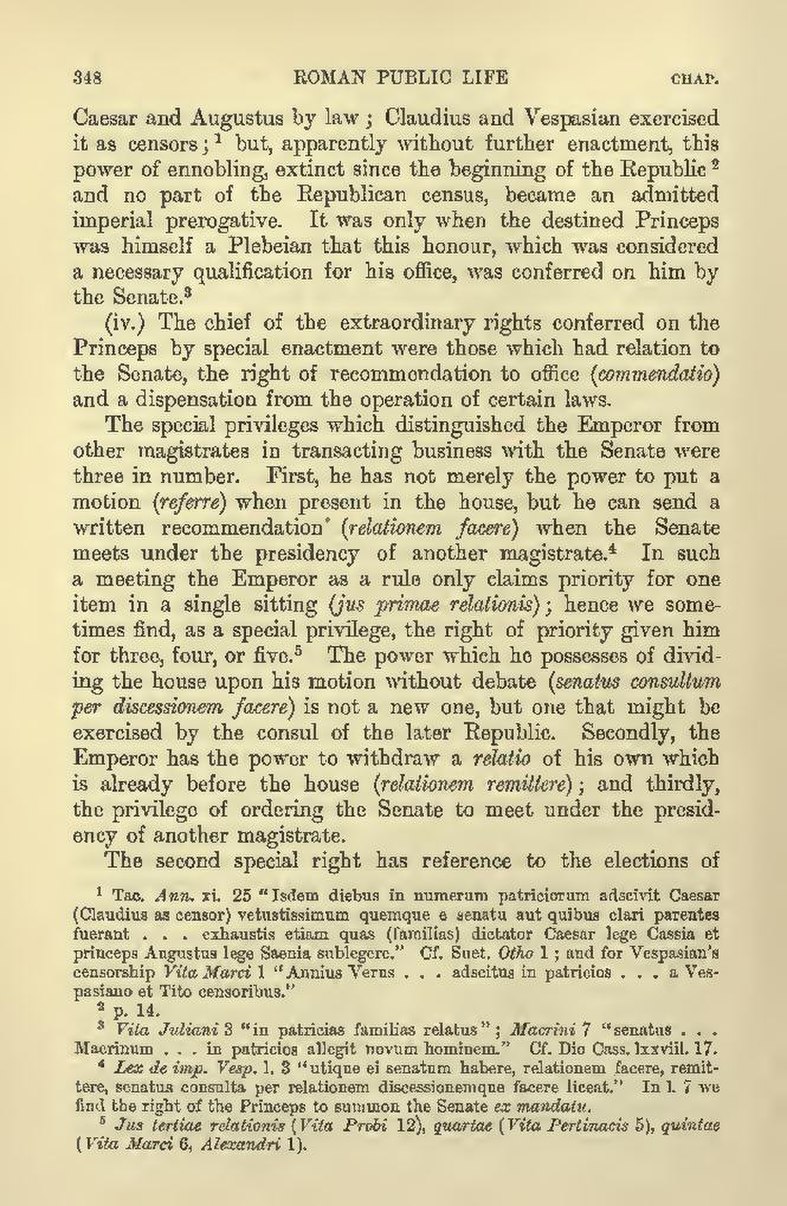Caesar and Augustus by law; Claudius and Vespasian exercised it as censors;[1] but, apparently without further enactment, this power of ennobling, extinct since the beginning of the Republic[2] and no part of the Republican census, became an admitted imperial prerogative. It was only when the destined Princeps was himself a Plebeian that this honour, which was considered a necessary qualification for his office, was conferred on him by the Senate.[3]
(iv.) The chief of the extraordinary rights conferred on the Princeps by special enactment were those which had relation to the Senate, the right of recommendation to office (commendatio) and a dispensation from the operation of certain laws.
The special privileges which distinguished the Emperor from other magistrates in transacting business with the Senate were three in number. First, he has not merely the power to put a motion (referre) when present in the house, but he can send a written recommendation (relationem facere) when the Senate meets under the presidency of another magistrate.[4] In such a meeting the Emperor as a rule only claims priority for one item in a single sitting (jus primae relationis); hence we sometimes find, as a special privilege, the right of priority given him for three, four, or five.[5] The power which he possesses of dividing the house upon his motion without debate (senatus consultum per discessionem facere) is not a new one, but one that might be exercised by the consul of the later Republic. Secondly, the Emperor has the power to withdraw a relatio of his own which is already before the house (relationem remittere); and thirdly, the privilege of ordering the Senate to meet under the presidency of another magistrate.
The second special right has reference to the elections of
- ↑ Tac. Ann. xi. 25 "Isdem diebus in numerum patriciorum adscivit Caesar (Claudius as censor) vetustissimum quemque e senatu aut quibus clari parentes fuerant . . . exhaustis etiam quas (familias) dictator Caesar lege Cassia et princeps Augustus lege Saenia sublegere." Cf. Suet. Otho 1; and for Vespasian's censorship Vita Marci 1 "Annius Verus . . . adscitus in patricios . . . a Vespasiano et Tito censoribus."
- ↑ p. 14.
- ↑ Vita Juliani 3 "in patricias familias relatus"; Macrini 7 "senatus . . . Macrinum . . . in patricios allegit novum hominem." Cf. Dio Cass. lxxviii 17.
- ↑ Lex de imp. Vesp. l. 3 "utique ei senatum habere, relationem facere, remittere, senatus consulta per relationem discessionemque facere liceat." In l. 7 we find the right of the Princeps to summon the Senate ex mandatu.
- ↑ Jus tertiae relationis (Vita Probi 12), quartae (Vita Pertinacis 5), quintae (Vita Marci 6, Alexandri 1).
